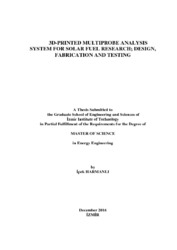Please use this identifier to cite or link to this item:
https://hdl.handle.net/11147/5736| Title: | 3D-printed multiprobe analysis system for solar fuel research; design, fabrication and testing | Other Titles: | Güneş yakıtları araştırmaları için üç boyutlu printer baskılı çoklu sensör analiz sistemi; dizaynı, üretimi ve test edilmesi | Authors: | Harmanlı, İpek | Advisors: | Karabudak, Engin Ebil, Özgenç |
Keywords: | Solar energy Photocatalytic water splitting 3-D drawing Solar fuels Mini photoreactor Trioxovanadate (V) chloride [PbVO3Cl] crystal |
Publisher: | Izmir Institute of Technology | Source: | Harmanlı, İ. (2016). 3D-printed multiprobe analysis system for solar fuel research; design, fabrication and testing. Unpublished master's thesis, İzmir Institute of Technology, İzmir, Turkey | Abstract: | Methods of generating electricity with unlimited, clean and cheap energy from solar energy are tried to be investigated and developed in practical and theoretical academic fields. Especially, photocatalytic water splitting (PWS) systems have been identified as the main method in this study as well as in many studies due to the advantages provided by production of solar fuels from water. In this research, a study was carried out on the alternatives of the both used experimental set-up and used photocatalytic material for PWS systems. A study has been carried out on both the used experimental setup and the used photocatalytic material alternatives in PWS systems. As an alternative experimental setup that allows small volume analysis for PWS by Unisense gas microsensors, a mini photoreactor was designed using 3-D drawing and printing techniques and its usability was tested for PWS applications. Moreover, some characterization results for the electronic band structure and the band gap of the lead (II) trioxovanadate (V) chloride [PbVO3Cl] crystal, which was discovered by Eanes and co-workers in 2007 at IZTECH, was introduced in this study by not only theoretical (DFT approximations; LDA, GGA and HSE06) but also experimental (XRD, Diffuse Reflectance Method- Tauc Plot, Raman Spectroscopy, Four Probe) methods. Also, its estimated theoretical price and its potential for future application in tandem solar fuel device as a photoanode in combination with Si photocathode was calculated and discussed. The results showed that the designed mini photoreactor system is an open to development apparatus that is suitable for PWS, besides, PbVO3Cl has an "indirect transition" band structure and a band energy of ~ 2.2 eV. Although it did not give an effective result in PWS applications done by the designed mini photoreactor, it can be said that it is a semiconductor which is worth studying and developing in detail for other researches in this field due to the compatibility of its band energy amount and optical properties for PWS. Son yıllarda dünyanın içinde bulunduğu enerji krizine alternatif olarak sunulan güneş enerjisi limitsiz olması, ücretsiz elde edilebilirliği ve çevre duyarlılığı ile alternatif enerji kaynağı araştırmaların en popüler konusu haline gelmiştir. Kullanıcılar için maliyetli olmayacak ve güneş enerjisini en verimli şekilde hayatımıza dahil edebilcek sistemleri arttırmak ve geliştirmek amacıyla birçok teknolojik ve bilimsel araştırma yapılmaktadır. Güneş enerjisinin kimyasal enerji olarak depolanmasıyla dolaylı yoldan elektrik üretimi sağlayan güneş yakıtlarını ve bu yakıtların fotokatalitik su ayrıştırması (FSA) basamağındaki sistemlerinin geliştirilmesini temel alan bu çalışmada; suyun fotokatalizi sırasında ihtiyaç duyduğu enerjiyi verimli şekilde güneşten almasına yardımcı ışığa duyarlı fotokatalitik bir malzeme ve hem bu malzemenin hem de önerilen tüm fotokatalitik malzemelerin küçük hacimlerde analiz edilebileceği bir deneysel düzenek önerilmiştir. Bu düzenek için ince uçlu gaz mikro-sensörleri kullanılmış ve 3D çizim/baskı teknikleri kullanılarak ufak bir fotoreaktör tasarlanıp bu reaktörün FSA yöntemindeki amacına uygunluğu test edilmiştir. Ayrıca, 2007’de Mehtap Emirdağ Eanes ve ekibi tarafından bulunan kurşun (II) trioksovanadat (V) klorür [PbVO3Cl] kristalinin elektronik bant yapısı ve bant enerjisinin tespiti için hem teorik (DFT yaklaşımları; LDA, GGA, HSE06) hem de deneysel karakterizasyon metotları (XRD, Diffuse Reflectance Method- Tauc Plot, Raman Spectroscopy, Four Probe) uygulanmış ve güneş yakıtı cihazlarında yarı iletken madde olarak kullanılabilirliği incelenmiştir. İlaveten, ileride PbVO3Cl’nin fotoanot, silikonun (Si) fotokatot olarak kullanıldığı çift katmanlı bir güneş yakıtı cihazının verimliliği ve PbVO3Cl’nin tahmini fiyatı teorik olarak hesaplanmış ve tartışılmıştır. Sonuçta, dizayn edilen mini fotoreaktör sisteminin FSA’nın amacına uygun ve geliştirilmeye açık bir deneysel düzenek olduğu, PbVO3Cl’nin ise “dolaylı geçiş” bant yapısına ve ~2.2 eV’lik bant enerjisine sahip olduğu ve FSA’da etkili bir sonuç vermese de optik özelliklerinin ve bant enerjisinin uygunluğu sebebiyle bu alanda yapılan diğer çalışmalar için daha detaylı incelenip geliştirilmeye değer bir yarı iletken olduğu söylenebilmektedir. |
Description: | Thesis (Master)--Izmir Institute of Technology, Energy Engineering, Izmir, 2016 Full text release delayed at author's request until 2020.01.24 Includes bibliographical references (leaves: 112-122) Text in English; Abstract: Turkish and English xii, 122 leaves |
URI: | http://hdl.handle.net/11147/5736 |
| Appears in Collections: | Master Degree / Yüksek Lisans Tezleri |
Files in This Item:
| File | Description | Size | Format | |
|---|---|---|---|---|
| T001557.pdf | MasterThesis | 6.22 MB | Adobe PDF |  View/Open |
CORE Recommender
Page view(s)
274
checked on Jul 22, 2024
Download(s)
162
checked on Jul 22, 2024
Google ScholarTM
Check
Items in GCRIS Repository are protected by copyright, with all rights reserved, unless otherwise indicated.